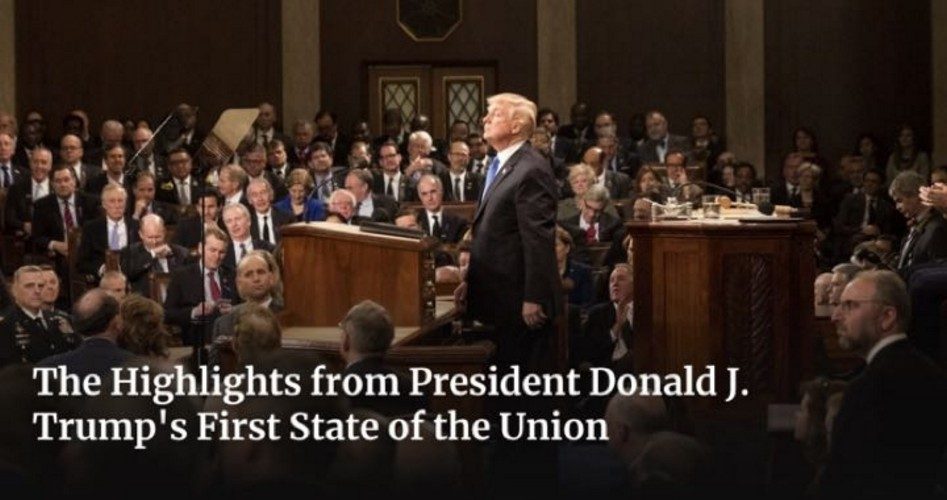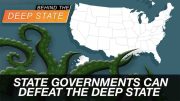
On Monday, February 5 at an appearance near Cincinnati, Ohio, President Donald Trump criticized Democratic lawmakers for their lack of enthusiastic response to his State of the Union speech. According to reports, the president characterized the congressional complacency as “un-American,” adding, “Can we call that treason? Why not?”
Earlier today (Tuesday), White House spokesman Hogan Gidley responded to questions about the remarks by insisting that the president “was obviously joking” about the charge of treason.
Gidley redirected the question to focus on the fact that, as ABC reports, “it seems Democrats have put their personal hatred for Trump above their desire to see their country succeed.”
Given the president’s personality and his way of speaking, it is, as the White House indicates, obvious that he was joking about congressmen being guilty of treason for not applauding his address. Being accused of treason (seriously accused) is a significant matter, though, and the issue deserves to be addressed.
{modulepos inner_text_ad}
The Constitution defines the charge of treason, but lamentably says nothing of any lesser-included crimes. We are left, therefore, to make educated assumptions as to when an act falls within the definition provided by Article III. As with so many other tasks of constitutional analysis, history of the clause itself and the application thereof illuminates the otherwise hazy borders of the law.
Our Founding Fathers did not create their accepted definition of treason from whole cloth. Rather, they incorporated the traditional definition of this most vile crime into the clauses of the Constitution created in Philadelphia in 1787.
The record of the deliberations of the Constitutional Convention makes it clear that the Framers intended to base the new charter’s treason clause on the Statute of 25 Edward III, wherein the essential elements of levying war, adhering to an enemy, and the giving of aid and comfort were set forth. In fact, such terms were already well established in the Anglo-Saxon jurisprudence before Edward III enacted his statute. As far back as Alfred the Great, the English proscribed such behavior and made it the only crime not compensable with money.
In the days following the ratification of the Constitution and the establishment of the national government created thereby, the question of the American definition of treason came up a few times and a finer point was put on one aspect of the crime: the punishment thereof. In the Act of April 30, 1790, Congress expressly named death as the penalty for conviction of the crime of treason.
American jurists continued, however, to look to the English constitution and the application of the laws thereof in the adjudication of treasonous activity in the New World. Dr. Benjamin Church, for example, was accused of relaying critical information to the British during the War for Independence. Serving as his own defense counsel, Church asserted his innocence, and he was eventually convicted only of “consorting with the enemy,” certainly a crime of much duller teeth than treason. Church was incarcerated in a Connecticut jail and was denied visitors except in the presence of the sheriff until his release.
Perhaps the most famous treason trial from the early days of our Republic is that held in the case of Aaron Burr in 1807. Vice President Burr was tried for treason for “conspiring to invade territories of a nation at peace with the United States.” Basically, Burr was accused of attempting to raise an army in order that he might invade a part of the Louisiana Territory and found a republic with himself as ruler.
The pertinent inquiry in this case in light of the Constitution’s embrace of the traditional English definition of treason was whether or not Burr’s actions rose to the level of levying war against the United States. The cast of characters in this melodrama reads like a “Who’s Who” in the Founding Generation. Thomas Jefferson, Burr’s running mate, loathed Burr and made regular premature pre-trial pronouncements of the accused’s guilt in the matter.
Another key figure in the cause of action was John Marshall. Marshall’s nascent form of judicial activism, as expressed in his decisions in the landmark Supreme Court cases of McCulloch v. Maryland and Marbury v. Madison, had already established him as a lightning rod for Republican sturm und drang.
In the Burr trial, Marshall once again delivered an opinion that was classed as clever by his proponents and inexplicable by his enemies. It was in this trial that Marshall enunciated the “levying war” doctrine wherein the law would require two witnesses to testify that they personally saw the accused preparing to levy war against the United States.
With Marshall’s interpretation of the “levying war” doctrine as a guide, a grand jury found Burr “not guilty” of treason.
The question of whether one has committed the crime of treason as defined in Article III of the Constitution is answered by a two-pronged analysis. First, did the accused levy war against the United States; or, second, did he adhere to an enemy of the United States by offering that enemy aid and comfort?
So as Democratic congressmen console themselves after having been offended by the president’s off-the-cuff joke about treason, we would all do well to remember that it is a serious charge and if we genuinely care about the future of this Republic, we must not shun from boldly crying “Treason!” against those who commit such unconscionable acts against the country. We must learn to identify such traitors despite their well-rehearsed performances designed to fool us into believing their allegiance.
As the noble Roman Cicero said over 2,000 years ago when faced with traitors in his midst:
A nation can survive its fools and even the ambitious. But it cannot survive treason from within. For the traitor appears no traitor; he speaks in the accents familiar to his victim, and he wears their face and their garments and he appeals to the baseness that lies deep in the hearts of all men. He rots the soul of a nation; he works secretly and unknown in the night to undermine the pillars of a city; he infects the body politic so that it can no longer resist. A murderer is less to be feared. The traitor is the plague.
Image: Screenshot from whitehouse.gov



